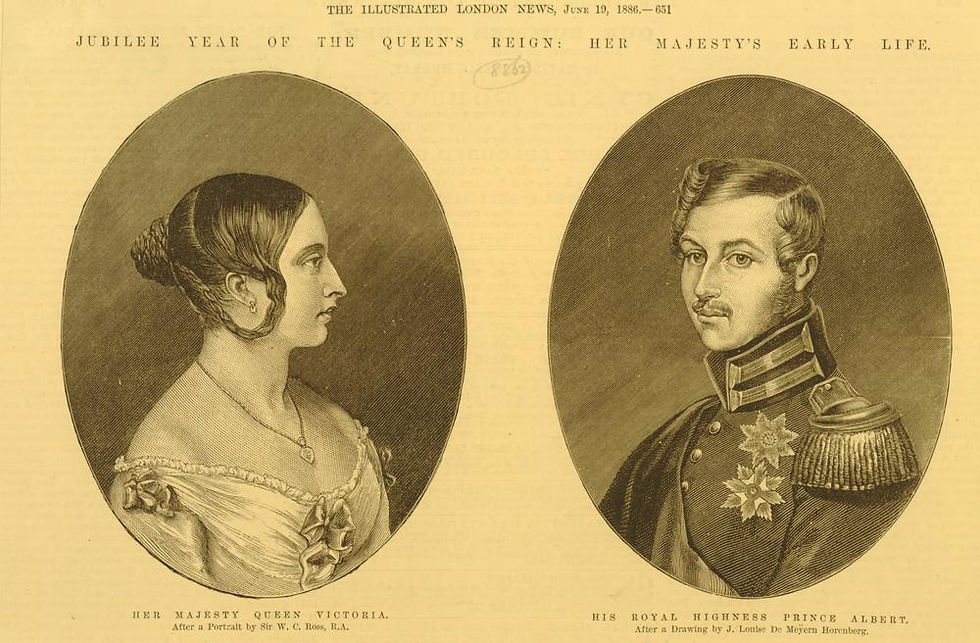The life of Prince Alfred, Hereditary Prince of Saxe-Coburg and Gotha
- Victoria Regina
- Feb 6, 2024
- 3 min read
Born in Buckingham Palace on the 15th October 1874, Prince Alfred was the eldest child and only son of Alfred, Duke of Edinburgh, and his wife, Grand Duchess Maria Alexandrovna of Russia. Today we will be looking into his difficult life and rather questionable death.

On the 23rd November 1874, the baby boy was christened with the names Alfred Alexander William Ernst Albert in the Lower Bow Room at Buckingham Palace. His godparents included were Queen Victoria; Emperor Alexander II of Russia; Wilhelm I, Ferman Emperor and King of Prussia; Victoria, Crown Princess of Germany; Ernst II, Duke if Saxe-Coburg and Gotha; and Albert Edward, Prince of Wales.
He was often known as ‘Young Affie’ by his family, the prince spent his early life at Clarence House with his parents and four sisters. By the time he began his education, his position as future Duke of Saxe-Coburg and Gotha became a nearing possibility. Realising the importance of this, his mother demanded he move to Potsdam and undergo a strict German education to mould him into the perfect Duke. Whilst he was undergoing his education, he also served as a Lieutenant in the Prussian 1st Foot Guards. Unlike many of his cousins and extended family, Alfred hated military life. The lack of parental guidance steered him into becoming what we call a 'rebel' he began indulging in mistresses and gambling which made him centre to various scandals. Some of these scandals stemmed a rumour of him supposedly marrying Mabel Fitzgerald, granddaughter of Charles FitzGerald, 4th Duke of Leinster, but this has never been authenticated.

He gradually distanced himself from his family and strayed into the aristocratic nightlife, it was a common activity for young men in the aristocratic circle ( although it was greatly shunned upon by the elders) Eventually In 1893, his father became Duke of Saxe-Coburg and Gotha, making Alfred the new Hereditary Prince. The Duke and his family moved into Schloss Rosenau in Coburg. Although his parents were ever more present in his life, his mother remained strict and would discipline Alfred for petty things. In 1895, his mother arranged for an engagement between Prince Alfred and Duchess Elsa of Württemberg. This plan fell through and the arranged marriage was soon called off but other potential suitors were put forward, including Princess Feodore of Saxe-Meiningen. It’s likely that it was his mother’s degrading attitude caused Alfred to rebel and take control of his own life. Unfortunately for the young Prince, his frivolous lifestyle soon caused him to contract syphilis, leading a number of health complications.

As time passed, Alfred’s health continued to deteriorate. His sister, Marie, Queen Consort of Romania, described how he had become pale as “his young life was wasting away”. she also went on to describe how “he hardly recognises anyone and often does not know what he says" the health complications took a toll on his mental health, his behaviour became erratic and unpredictable. On 23rd January 1899, the Duke and Duchess were celebrating their 25th wedding anniversary but Prince Alfred was noticeably absent. During the celebrations, the 24 year old Prince is said to have shot himself. Although he survived and doctors recommended him to rest and recuperate. However, his mother demanded that he go to Sanatorium Martinsbrunn in Mearan to recover properly from “nervous depression”. Tragically, Alfred died there less than two weeks later, on 6th February. The Duke was so angry at his wife that he is thought to have never slept under the same roof as her again, he blamed her for his only sons death.

The official cause of Prince Alfred's death was recorded as “chronic cerebral affection”, although the exact cause will never be completely uncovered. Alfred’s body was laid to rest at Friedrich am Glockenberg in Coburg. Later in 1899 Alfred’s uncle the Duke of Connaught and his son Prince Arthur of Connaught renounced their succession rights to the Duchy of Saxe-Coburg and Gotha. As a result, his first cousin Prince Charles Edward, Duke of Albany, became heir presumptive.



Comments